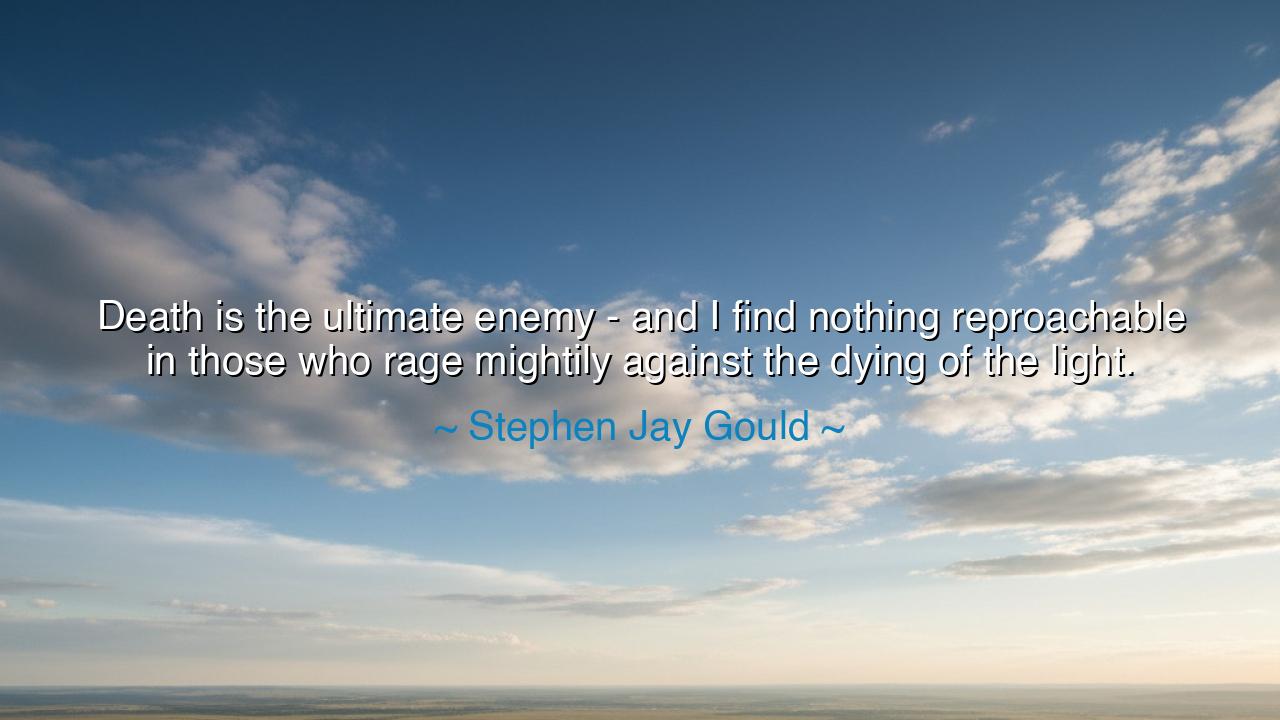
Death is the ultimate enemy - and I find nothing reproachable in
Death is the ultimate enemy - and I find nothing reproachable in those who rage mightily against the dying of the light.






“Death is the ultimate enemy—and I find nothing reproachable in those who rage mightily against the dying of the light.” Thus spoke Stephen Jay Gould, the scholar of life’s deep history, the scientist-poet who gazed into the heart of evolution and found both wonder and terror there. In these words, he joins the eternal conversation of humankind with mortality, that oldest and fiercest of foes. For in this statement, Gould does not merely affirm life’s preciousness—he sanctifies the struggle to hold fast to it. He rejects the cold resignation that accepts death as gentle or noble. To him, death is the final adversary, the shadow that haunts all sentient beings—and to resist it, even in vain, is the noblest expression of being alive.
This quote, spoken in the twilight of Gould’s own battle with cancer, draws its origin from both science and spirit. As a biologist, he knew that death is woven into the very fabric of existence—the mechanism through which evolution renews life. Yet as a man, he felt the profound human instinct to rebel against oblivion. In this dual awareness lies the heart of his wisdom: that to know death is inevitable does not mean one must bow to it quietly. Rather, the greatness of humanity is revealed in defiance—in the raging refusal to let the flame of consciousness be snuffed without protest. His words echo those of Dylan Thomas, who urged, “Rage, rage against the dying of the light.” Gould, like Thomas, believed that resistance, even when futile, is an act of dignity.
For throughout history, the finest spirits have waged this same war. Think of Socrates, standing before his accusers in Athens. When offered a chance to save himself through dishonor, he refused, choosing death over the betrayal of his principles. Yet even in accepting his fate, he did not go gently—he met death with courage, curiosity, and clarity of mind. Or consider Beethoven, who, though struck deaf in the prime of life, refused to yield to despair. He wrote his greatest symphonies after silence had fallen upon him, declaring through music what could no longer be spoken: that the soul, though fragile, is unconquerable. These are not tales of surrender, but of humanity’s eternal rebellion—the proof that to live well is to fight well, even against the unbeatable.
Gould’s phrase “the ultimate enemy” carries the weight of both personal and collective truth. Every civilization has built its monuments, its myths, and its faiths in answer to this same adversary. The pyramids of Egypt, the temples of India, the cathedrals of Europe—all were born from the yearning to transcend mortality. The ancients named death as a god, yet feared and sought to master it through ritual, through remembrance, through meaning. In calling death an “enemy,” Gould restores the ancient fire of this struggle. He tells us that to fear death is not cowardice, but reverence for life; that to fight it—through medicine, art, science, or faith—is to honor the spark within us that demands to endure.
Yet he does not call us to delusion. Gould knew, as all wise souls must, that death cannot be defeated, only resisted. The victory, then, is not in survival, but in the spirit of the battle itself. When he says he finds “nothing reproachable” in those who rage, he blesses the human will to hope, even against certainty. The mother who clings to her child’s hand in illness, the soldier who shields his fallen comrade, the old man who still tends his garden though winter approaches—all are expressions of the same sacred defiance. It is not the outcome that sanctifies them, but the courage to struggle on when surrender seems easiest.
There is a profound paradox in this: that life gains its beauty from its impermanence, and yet we cannot bear to let it go. This tension is what gives rise to art, love, and meaning—the attempts of the mortal to touch eternity. In Gould’s own life, his battle with cancer became a testament to this truth. Diagnosed with a rare and deadly form of the disease, he was told he had little time. Yet he endured for decades more, continuing to teach, to write, to explore the mysteries of nature. He did not conquer death; he outwitted it through living with intensity and purpose. His life became an answer to his own words: that to rage against the dying of the light is not foolish—it is heroic.
And so, O listener, take this teaching as both warning and inspiration. Do not glorify death, nor accept it as a friend too soon. Let it sharpen your awareness, not dull your courage. Live fiercely, as if each dawn were a battle won. Create, love, strive, and leave something behind that will outlast your bones. For in the end, the meaning of life is not found in the number of years we are granted, but in the passion with which we spend them. When the final hour comes, let it find you not silent, but alive to the very end—your heart burning against the darkness, your spirit proclaiming, as Stephen Jay Gould did: “I raged, and in that rage, I truly lived.”






AAdministratorAdministrator
Welcome, honored guests. Please leave a comment, we will respond soon